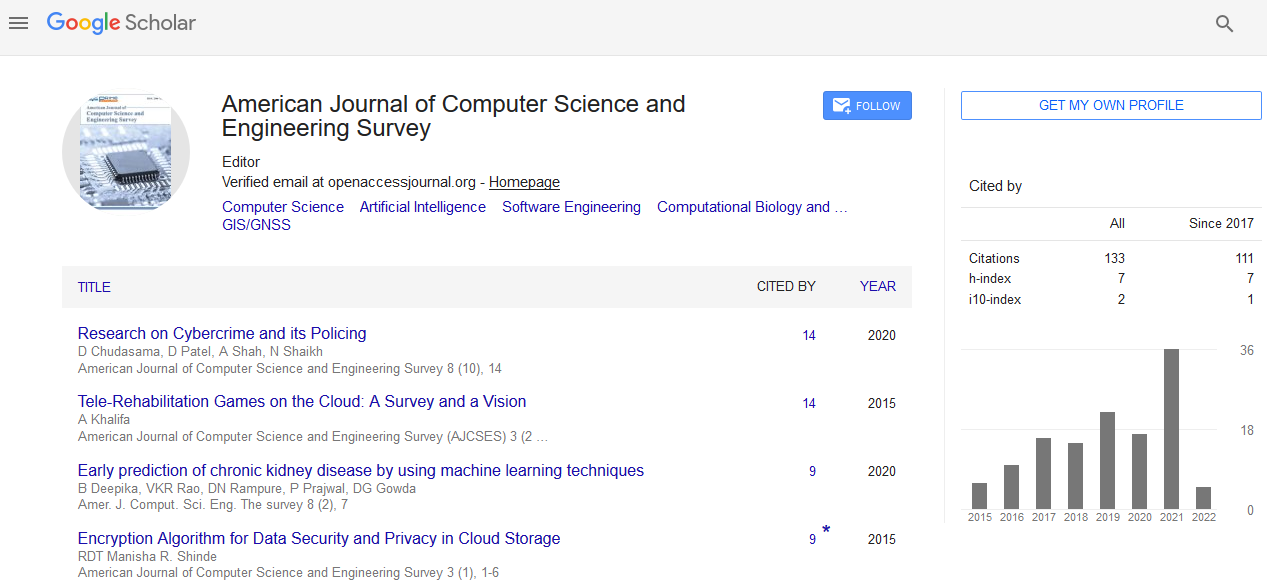Commentary - (2024) Volume 12, Issue 1
Advancements and Implications of Health Informatics in Modern Healthcare
Wesly Jackson*
Department of Health Sciences, University of Bath, United Kingdom
*Correspondence:
Wesly Jackson,
Department of Health Sciences, University of Bath,
United Kingdom,
Email:
Received: 28-Feb-2024, Manuscript No. IPACSES-24-19980;
Editor assigned: 01-Mar-2024, Pre QC No. IPACSES-24-19980 (PQ);
Reviewed: 15-Mar-2024, QC No. IPACSES-24-19980;
Revised: 20-Mar-2024, Manuscript No. IPACSES-24-19980 (R);
Published:
27-Mar-2024, DOI: 10.36846/2349-7238.24.12.03
Description
Health informatics, a multidisciplinary field encompassing
the intersection of healthcare, information technology, and
data science, has revolutionized the delivery, management,
and analysis of healthcare services. This paper explores
the evolution, current state, and future prospects of health
informatics. It discusses its applications in Electronic Health
Records (EHRs), telemedicine, Clinical Decision Support
Systems (CDSS), and public health surveillance. Furthermore, it
delves into the challenges and ethical considerations associated
with the widespread adoption of health informatics. Overall,
this paper underscores the pivotal role of health informatics
in enhancing healthcare quality, efficiency, and accessibility.
Health informatics, also known as healthcare informatics or
medical informatics, refers to the application of information
technology and data science in the field of healthcare to
optimize the storage, retrieval, and use of health information.
With the rapid advancement of technology, health informatics
has become an indispensable tool for healthcare providers,
administrators, researchers, and policymakers. This paper
aims to provide an overview of the evolution, applications,
challenges, and future directions of health informatics. The
roots of health informatics can be traced back to the early
20th century with the emergence of medical records systems.
However, the field experienced significant growth in the
latter half of the century with the advent of computers and
electronic data processing. The development of electronic
health records (EHRs) in the 21st century marked a milestone in
health informatics, facilitating the digital storage and exchange
of patient information. Subsequent advancements in data
analytics, artificial intelligence (AI), and machine learning
have further expanded the capabilities of health informatics,
enabling predictive analytics, personalized medicine, and
population health management. Health informatics has diverse
applications across various domains of healthcare, including:
Electronic Health Records (EHRs): EHR systems enable
healthcare providers to maintain comprehensive, digital
records of patient health information, enhancing accessibility,
accuracy, and interoperability. Telemedicine: Telemedicine
platforms leverage health informatics technologies to facilitate
remote consultations, diagnosis, and treatment, thereby
improving healthcare access, particularly in underserved areas.
Clinical Decision Support Systems (CDSS): CDSS utilize health
informatics algorithms and data analytics to assist healthcare
providers in making evidence-based clinical decisions, reducing
medical errors, and improving patient outcomes. Public
Health Surveillance: Health informatics plays a critical role in
public health surveillance by enabling real-time monitoring
of disease outbreaks, environmental hazards, and population
health trends, facilitating timely interventions and preventive
measures. Despite its numerous benefits, the widespread
adoption of health informatics poses several challenges
and ethical considerations, including: Data Security and
Privacy: The digitization of health information raises concerns
regarding data security, privacy breaches, and unauthorized
access to sensitive patient data. Interoperability: Ensuring
interoperability and seamless data exchange among disparate
health informatics systems remains a significant challenge,
hindering care coordination and information sharing. Bias
and Equity: Health informatics algorithms may exhibit bias
and inequities, particularly in marginalized populations,
exacerbating healthcare disparities and perpetuating systemic
injustices.
Acknowledgement
None.
Conflict Of Interest
None.
Citation: Jackson W (2024) Advancements and Implications of Health Informatics in Modern Healthcare. Am J Comp Science. 12:03.
Copyright: © 2024 Jackson W. This is an open-access article distributed under the terms of the Creative Commons Attribution License, which permits unrestricted use, distribution and reproduction in any medium, provided the original author and source are credited.

